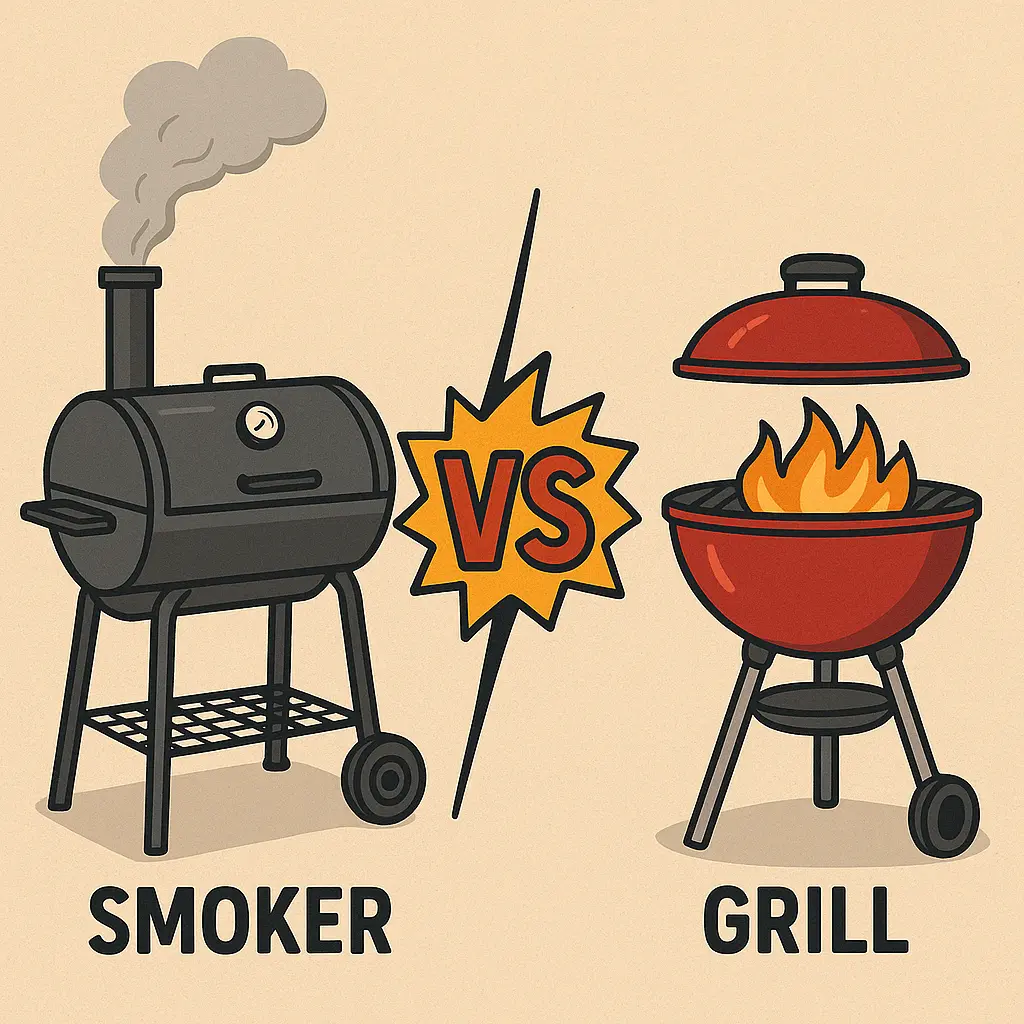This post may contain affiliate links. If you use these links to buy something we may earn a small commission. Thanks.
If you’re passionate about outdoor cooking, chances are you’ve heard the age-old debate: smokers vs grills. Both are cornerstones of backyard barbecues, tailgates, and family gatherings. But when it comes down to choosing the right cooking equipment for your needs, understanding the differences can make all the difference in flavor, convenience, and experience.
This guide explores how smokers and grills differ, their pros and cons, and which one best suits your lifestyle. Whether you’re a BBQ purist chasing that fall-off-the-bone brisket or a weeknight griller craving burgers in 15 minutes, this article will help you decide wisely.

What is a Smoker?
A smoker is an outdoor cooking appliance designed for low-and-slow cooking. It works by exposing food to smoke generated from burning wood, charcoal, or pellets at low temperatures over extended periods usually hours. The result? Deeply infused smoky flavors and exceptionally tender meat.
How It Works
Smokers cook food indirectly. Heat and smoke are generated in a separate chamber or area and slowly circulate around the food. This gentle method is ideal for larger or tougher cuts of meat that benefit from gradual rendering of fat and connective tissue.
Common Fuel Types
- Wood logs or chunks: Classic choice for traditional barbecue with intense smoke flavor.
- Charcoal: Offers a balance between heat and smoke.
- Electric: Provides easy temperature control with minimal monitoring.
- Pellets: Compressed wood pellets are automatically fed into a firepot for consistent heat and smoke.
Popular Types of Smokers
- Offset Smokers: Feature a firebox on the side that feeds smoke into the main chamber.
- Vertical/Water Smokers: Compact and efficient, often include a water pan to regulate temperature and moisture.
- Cabinet Smokers: Resemble a mini fridge with racks; perfect for controlled cooking.
- Electric Smokers: Plug-and-play option for those seeking convenience.
- Pellet Smokers: Offer digital controls for precise temperature and automatic pellet feeding.
What is a Grill?
A grill is a high-heat cooking device used to quickly sear and cook food directly over a flame or heat source. Grilling is perfect for food that benefits from caramelization and a crisp outer layer think burgers, steaks, hot dogs, and vegetables.
How It Works
Grills use direct heat to cook food, typically at temperatures between 300°F and 700°F or more. Food is placed directly over the flame or heated grates, allowing for quick cook times and bold charred flavors.
Common Fuel Types
- Charcoal: Offers intense heat and a smoky flavor.
- Gas (Propane/Natural): Provides consistent heat and ease of use.
- Pellet Grills: Use wood pellets and can double as smokers.
- Electric Grills: Compact and suitable for indoor or balcony use.
Popular Types of Grills
- Charcoal Grills: Budget-friendly and smoky, but require more effort to light and control.
- Gas Grills: Fast, easy to use, and great for weekday grilling.
- Pellet Grills: Combine convenience with wood flavor.
- Infrared Grills: Use radiant heat for even cooking and excellent searing.
Key Differences Between Smokers and Grills
| Feature | Smoker | Grill |
|---|---|---|
| Temperature Range | 180°F–275°F | 300°F–700°F+ |
| Cooking Time | 4 to 16 hours (or more) | 10 to 60 minutes |
| Flavor | Deep, wood-smoked flavor | Charred, grilled flavor |
| Cooking Method | Indirect, low and slow | Direct, high and fast |
| Versatility | Best for meats like brisket, ribs, pork butt | Ideal for burgers, steaks, veggies, chicken |
| Learning Curve | Steeper; needs temperature and smoke control | Moderate; easy to learn |
| Maintenance | Requires ash/grease cleanup, wood management | Easier to clean, especially gas grills |
Pros and Cons
A. Smokers
Pros
- Unbeatable Flavor
Smoking creates a rich, layered flavor that penetrates deeply into the meat. If you love authentic BBQ, this is the real deal. - Perfect for Large Cuts
Brisket, pork shoulder, ribs smokers are made for them. The low temps break down collagen and fat, producing juicy and tender meat. - Flavor Customization
With different wood types like hickory, applewood, mesquite, and cherry, you can personalize the smoke profile to your liking. - Great for Batch Cooking
Smokers often have racks and large chambers, allowing you to cook in bulk for parties or meal prep. - Advanced Models Have Set-and-Forget Features
Pellet and electric smokers come with digital controls for steady temps and minimal monitoring.
Cons
- Time-Consuming
Smoking takes commitment. Some cuts may need 12+ hours to reach perfection. - Learning Curve
Managing temperature, airflow, and fuel takes time to master, especially with offset or charcoal smokers. - Less Versatile for Quick Meals
Not ideal for weeknight grilling unless you’re reheating smoked food. - More Maintenance
Ash, grease, and smoke residue buildup require regular cleaning.
B. Grills
Pros
- Quick Cook Times
Perfect for spontaneous meals, grilling takes just minutes to deliver delicious results. - Easy to Use
Especially with gas or electric grills, you just turn a knob and go. - Versatile Cooking Options
You can grill meats, veggies, seafood, and even fruit or bread with the right setup. - Affordable Entry Points
Basic charcoal grills are inexpensive, and many gas models are budget-friendly too. - Easy to Maintain
Most grills have removable grease trays and are easy to clean, especially gas and electric options.
Cons
- Less Smoky Flavor
While you can get char, you won’t achieve the same smoke penetration as a smoker. - Risk of Flare-Ups
Dripping fat can cause flames that might burn your food. - Not Ideal for Large Cuts
Unless you’re indirect grilling or using accessories, low-and-slow meats are hard to nail. - Hot Spots and Uneven Heating
Cheaper grills may have inconsistent heating zones.
Which One Should You Choose?
Choose a Smoker If:
- You’re passionate about BBQ culture and want the most flavorful results.
- You enjoy cooking slowly over time—like a weekend project or family gathering.
- You often cook brisket, ribs, or other large cuts.
- You want to experiment with wood chips and smoking techniques.
- You’re okay with investing more time and effort into the cooking process.
Choose a Grill If:
- You prefer convenience and quick cooking, especially on busy weeknights.
- You love grilled flavors but don’t need deep smoke in every meal.
- You want to cook a variety of foods like burgers, skewers, vegetables, or fish.
- You’re new to outdoor cooking and want an easy entry point.
- You’re limited on space or time.
Combo Units: Best of Both Worlds?
If you can’t decide, combo units offer both grilling and smoking capabilities in one package. These are either dual-chamber setups or hybrid grills with adjustable heat zones and smoke boxes.
Benefits of Combo Units
- Versatility: Grill one day, smoke the next or both at once.
- Space-Saving: Great for small patios or limited backyard space.
- Budget-Friendly: One purchase covers both needs.
- Perfect for Entertainers: Cook a range of dishes for all tastes.
Downsides
- May Not Master Either Function: You sacrifice some performance for flexibility.
- Larger Footprint: Some combos are bulky and harder to move.
- Complex Assembly & Maintenance: More moving parts and cleaning needs.
Top Recommended Combo Models
- Pit Boss Navigator Series: A pellet grill with grilling and smoking capacity.
- Char-Griller Akorn Kamado: Can grill, smoke, and even bake.
- Oklahoma Joe’s Charcoal/LP Gas Smoker Combo: Combines multiple fuel types for true versatility.
Conclusion
The decision between a smoker and a grill really comes down to your cooking style and priorities. If you dream of slow-cooked brisket infused with hickory smoke, a smoker is your best friend. If you love throwing together burgers in 20 minutes, a grill will serve you well.
Don’t forget there’s no rule that says you can’t have both. Many barbecue lovers build their backyard arsenal over time, starting with a grill and eventually adding a smoker as they expand their culinary skills.
Whatever your choice, both tools open the door to delicious outdoor meals and unforgettable gatherings.
FAQs
1. Can you smoke meat on a regular grill?
Yes, with a few adjustments. Using indirect heat and a smoker box or wood chips wrapped in foil can turn a charcoal or gas grill into a makeshift smoker. However, it’s best for shorter smokes like chicken or fish long smokes are harder to manage consistently.
2. What’s easier to use: a smoker or a grill?
Grills, especially gas or electric ones, are easier to use and require less monitoring. Smokers, particularly charcoal or offset models, have a steeper learning curve due to temperature management and longer cooking times.
3. Which is healthier grilled or smoked food?
Both methods can be healthy when lean meats and proper techniques are used. However, over-smoking or charring meat can produce harmful compounds. Moderation, marination, and avoiding overcooking are key to making both options health-friendly.
4. How much maintenance does each require?
Smokers usually require more maintenance due to longer cook times, smoke buildup, and ash removal. Grills, especially gas models, are quicker to clean, with removable trays and easier surfaces.
5. Can you get both a smoker and a grill in one?
Yes! Combo units offer dual functionality, combining grilling and smoking in one machine. While they may not be as specialized as standalone models, they’re a great choice for those wanting flexibility and saving space.
